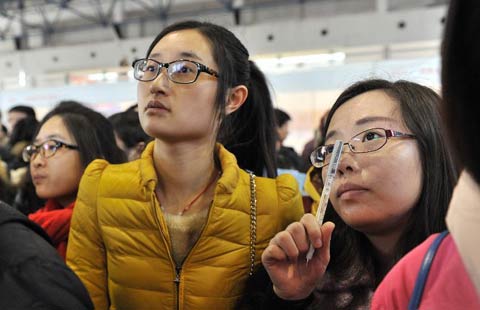Viptera corn 'approved' for import
By ZHONG NAN (China Daily) Updated: 2014-12-19 07:46
 |
|
The logo of Swiss agrochemicals maker Syngenta is seen in front of a cornfield near the company's plant in Stein near Basel. China has reportedly approved imports of Syngenta AG's Agrisure Viptera, a type of genetically modified corn.[Photo/Agencies] |
Crop at the center of US legal cases
The government is reported to have cleared the import of a type of genetically modified corn at the center of lawsuits against the Swiss seed developer Syngenta AG, a year after blocking the crop's entry.
US Agriculture Secretary Tom Vilsack told Reuters that China's Ministry of Agriculture had also approved imports of biotech soybeans developed by DuPont Pioneer of the United States and Germany's Bayer CropScience AG.
Vilsack was quoted by the agency as saying Chinese Vice-Premier Wang Yang said imports of Agrisure Viptera, also known as MIR 162, had been approved by the government during this week's 25th Joint Commission on Commerce and Trade in Chicago.
Senior officials from both countries have been scheduled to address differences on trade and investment potential at the event in areas such as agriculture, infrastructure and tourism.
The agriculture ministry did not respond to requests for further information.
Dozens of US farmers have sued Syngenta over MIR 162, claiming the seedmaker misled the farm industry about the timeline for approval from China, a major buyer.
Ding Lixin, a researcher at the Chinese Academy of Agricultural Sciences in Beijing, said: "Official consent for the import of MIR 162 would be meaningful because US corn trading with China has essentially shut down since China started turning away cargoes containing the corn in November 2013. It was approved for planting in the US but not for sale in China. "
The Swiss-based seed developer told Reuters on Friday it was expecting China to clear imports soon.
China is now the US's largest export market with $26 billion of exports in 2014, up 11 percent from the previous year. It is also the largest international market for US food and agricultural products, accounting for 20 percent of all US farm exports, according to the US Department of Agriculture.
"This move would also improve the Swiss company's earning ability and confidence in the global market, as it needs to pay legal settlements to more than 100 US farmers and exporters, after it was being sued for damages from grain shipments rejected by China," Ding said.
The approval might also raise hopes of more US exports to the world's fastest-growing corn market, Ding said, as well as supporting prices in the global market.
Eager to ensure its grain security and have a further understanding about bio-technology, China has been increasing its investment in the development of agricultural bio-technology, according to government agricultural policy documents released over the past two years.
Bio-technology hybrid corn products are currently grown in 29 countries around the world.
"China has already adopted genetically modified cotton technology and the impact on health and yield has been substantial," said Hu Zengmin, an analyst at the China National Grain and Oils Information Center. Hu said bio-technology has increased yields especially in developing countries, and even though the GMO corns will only be used in scientific tests, animal feed and bio-chemical industries under government regulations, China will eventually benefit from their adoption.
- Pingtan to play key role in economic cooperation
- Tariff ruling further dims solar prospects in United States
- Job seekers attend job fair for postgraduates in Beijing
- Housing market touches bottom, NBS figures show
- Top 10 immigration destinations for Chinese
- Coal companies on the edge as sales nose-dive
- Viptera corn 'approved' for import
- Forex regulator plans further RMB liberalization measures

















